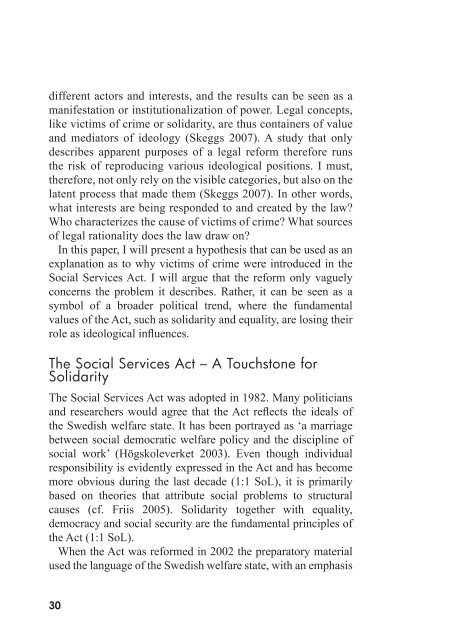Thinking with Bevereley Skeggs - Stockholms universitet
Thinking with Bevereley Skeggs - Stockholms universitet
Thinking with Bevereley Skeggs - Stockholms universitet
- No tags were found...
You also want an ePaper? Increase the reach of your titles
YUMPU automatically turns print PDFs into web optimized ePapers that Google loves.
different actors and interests, and the results can be seen as amanifestation or institutionalization of power. Legal concepts,like victims of crime or solidarity, are thus containers of valueand mediators of ideology (<strong>Skeggs</strong> 2007). A study that onlydescribes apparent purposes of a legal reform therefore runsthe risk of reproducing various ideological positions. I must,therefore, not only rely on the visible categories, but also on thelatent process that made them (<strong>Skeggs</strong> 2007). In other words,what interests are being responded to and created by the law?Who characterizes the cause of victims of crime? What sourcesof legal rationality does the law draw on?In this paper, I will present a hypothesis that can be used as anexplanation as to why victims of crime were introduced in theSocial Services Act. I will argue that the reform only vaguelyconcerns the problem it describes. Rather, it can be seen as asymbol of a broader political trend, where the fundamentalvalues of the Act, such as solidarity and equality, are losing theirrole as ideological influences.The Social Services Act – A Touchstone forSolidarityThe Social Services Act was adopted in 1982. Many politiciansand researchers would agree that the Act reflects the ideals ofthe Swedish welfare state. It has been portrayed as ‘a marriagebetween social democratic welfare policy and the discipline ofsocial work’ (Högskoleverket 2003). Even though individualresponsibility is evidently expressed in the Act and has becomemore obvious during the last decade (1:1 SoL), it is primarilybased on theories that attribute social problems to structuralcauses (cf. Friis 2005). Solidarity together <strong>with</strong> equality,democracy and social security are the fundamental principles ofthe Act (1:1 SoL).When the Act was reformed in 2002 the preparatory materialused the language of the Swedish welfare state, <strong>with</strong> an emphasis30
















